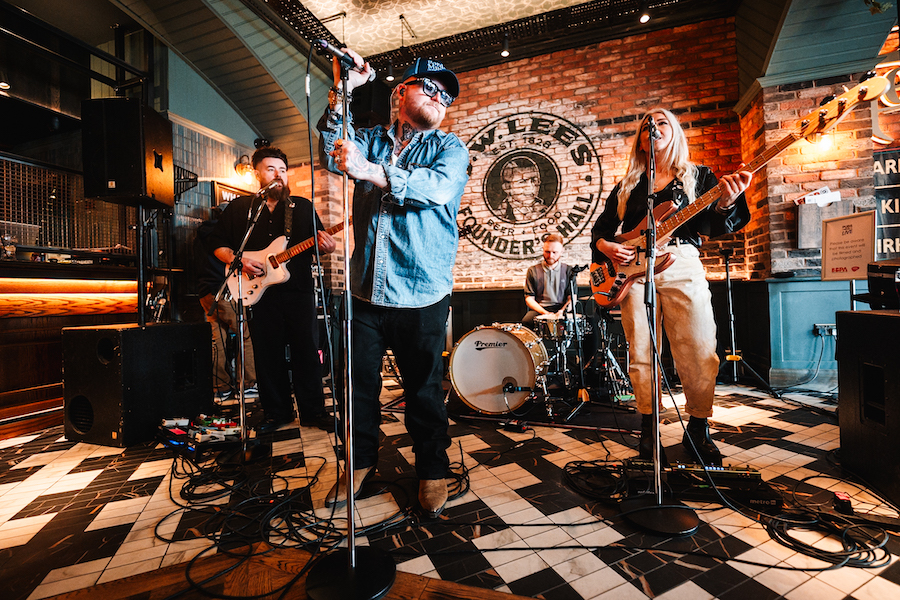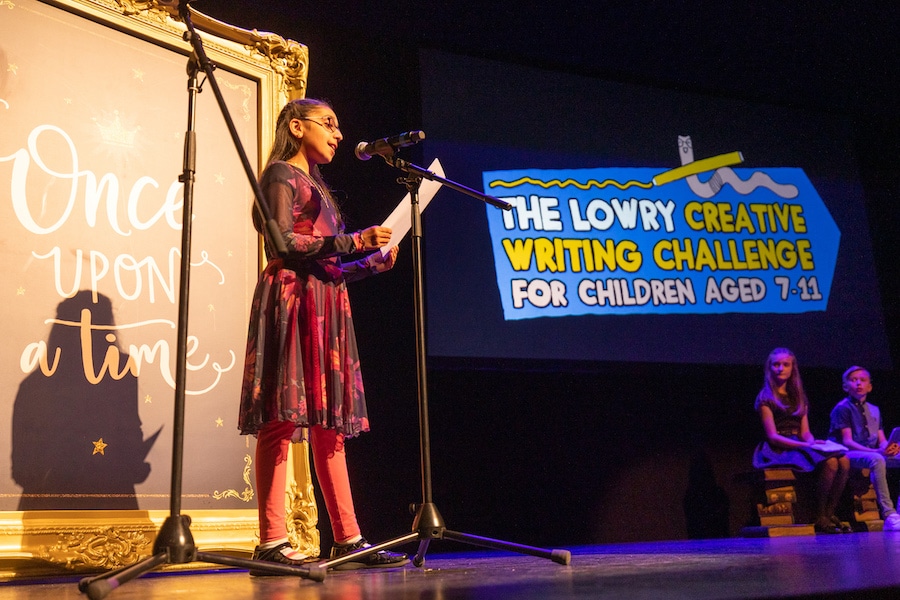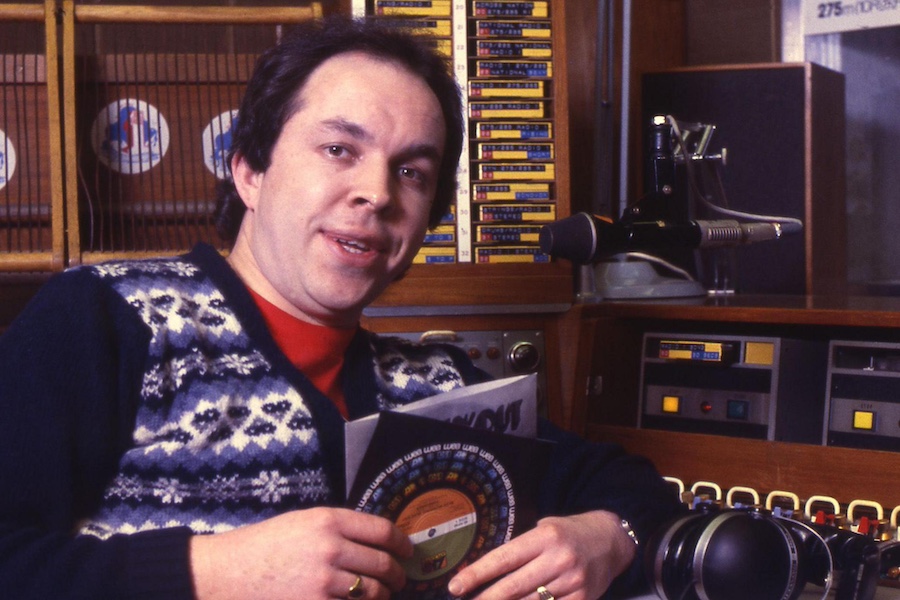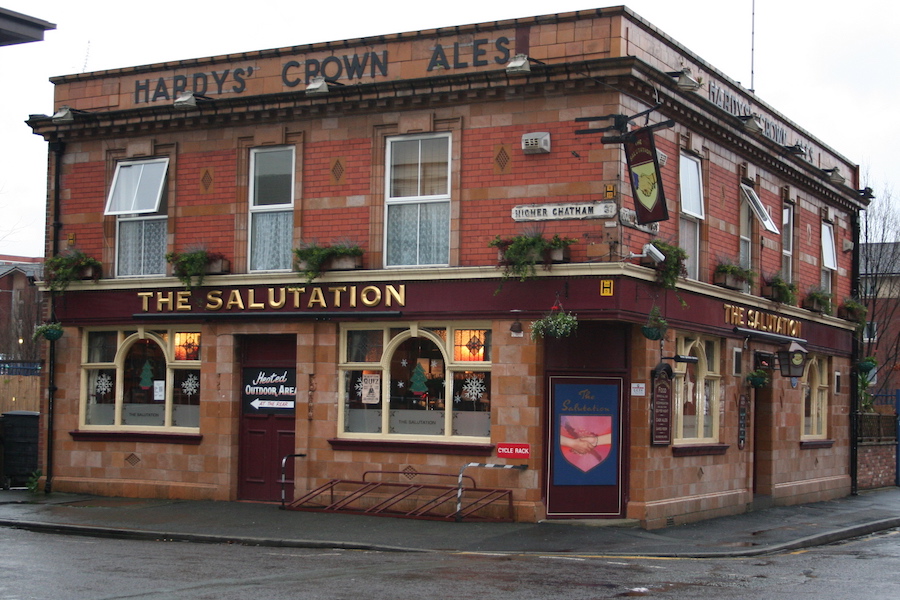This is the place: why Ancoats is Manchester’s coolest neighbourhood
- Written by Georgina Pellant
- Last updated 1 year ago
- City of Manchester, Community, Cornerstone, Culture, Food & Drink
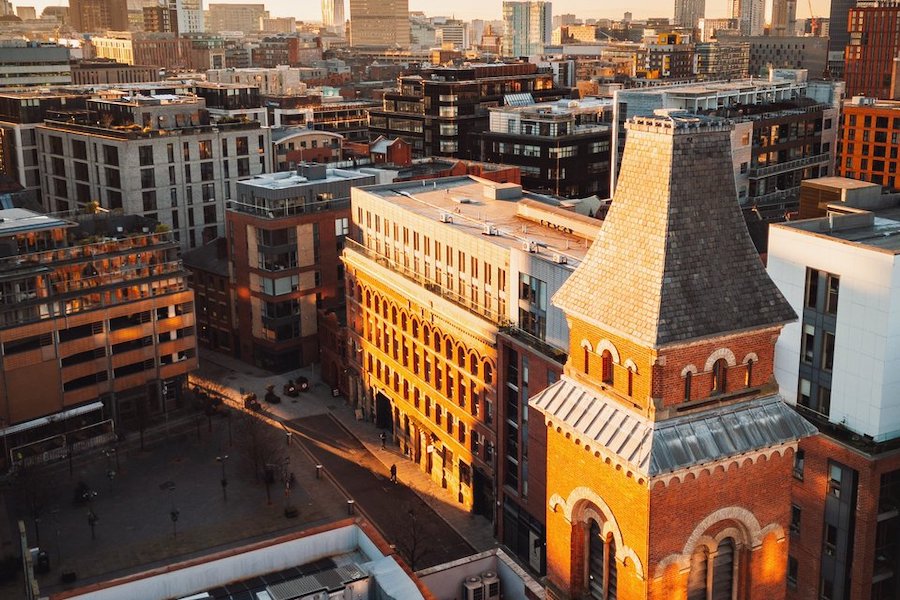
Ancoats has managed to retain its individuality, thanks to a good selection of local shops and restaurants that are ahead of the game in the heart of the action.
Once home to the textile mills that defined Manchester’s reputation as ‘cottonopolis’, as well as manufacturing industries such as glass and newspaper printing, Ancoats once had an unsavoury reputation but is now one of the UK’s hippest neighbourhoods.
The area had a population larger than towns such as Bury and Blackburn in the 1850s, though poverty was rife, as were gang fights or ‘scuttles’. Street signs still reflect the unsavoury past – Bengal Street home to Victorian mob the Bengal Tigers, and Angel Meadows home to the Angels.
Following years of economic decline, Ancoats continued to suffer a dubious reputation, and many buildings lay empty. But thanks to regeneration and, in 1998, becoming an Area of Conservation, the area once known as Ancoats Little Italy, thanks to its high influx of Italian immigrants in the nineteenth century, is starting to flourish again.
Derelict mills and seedy street scenes have been replaced by artisan coffee shops, craft beer bars and must-visit dining destinations, with the San Francisco Chronicle last year listing Ancoats as one of the best places to visit, and The Times including it in their top twenty places to live.
Ancoats has come a long way, now boasting an incredible community of independent businesses that have transformed the once-industrial landscape into a thriving culinary and cultural hub.
The area is now home to many brave independent success stories. Like everything great in Manchester, the whole area is driven by a uniquely close sense of community – and that is one of the things that makes it so special. It’s attracting more and more independents on the up, and they all seem to be thriving.
Local knowledge
“I’ve lived in Ancoats for years now, and the extent and speed of regeneration is incredible,” says Adam Whittaker, a freelance food and drink marketer and social media manager.
“However, as a frequent visitor to Manchester for many years prior to moving here, it is the complete transformation of the area that is unbelievable. What once was a definite ‘no go’ area, especially in the evening, is now an exciting hub of excellent restaurants, bars and independent retailers,” says Adam.
Mana remains, despite stiff competition, remains the only Michelin-starred restaurant in the city. Manchester has waited a long time for Michelin recognition, and chef Simon Martin is more than deserving. But fingers crossed the city gets another when the Michelin team come to town in February to host their annual ceremony.
Today, the area is well known as one of the world’s coolest neighbourhoods.
But it wasn’t always so charming. In fact, during the Industrial Revolution, Ancoats was considered a bit of a toilet.
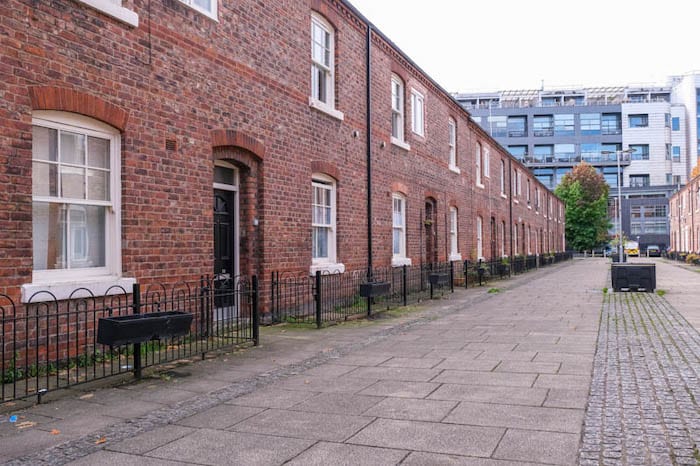
The first official recording of the area dates back to 1212, at which point it was called ‘Elnecot’ – a name derived from the Old English ‘Ana Cots’ or ‘lonely cottages’.
The 1800s put the area on the map as it became known as “the world’s first industrial suburb”.
Once home to the mills that earned Manchester its nickname ‘cottonopolis’, Ancoats was also a centre of manufacture for machinery, glass and newspapers. But come the 1990s, the cotton mills had closed and it was more of an industrial wasteland, with 80% of business space left vacant.
Nowadays, the area is constantly changing but you can still find the street signs that gave name to the notorious ‘scuttlers’ who once fought here. For example, Bengal Street was home to the Bengal Tigers, and Angel Meadow the Angels.
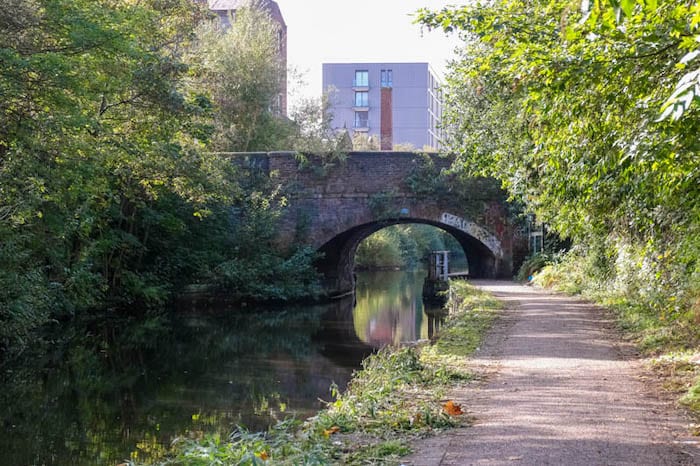
Transport and travel
Ancoats is incredibly well-connected thanks to its proximity to the city centre. It’s a quick tram ride from Piccadilly station and sits right next to the Great Ancoats Street ring road meaning it’s convenient for drivers too.
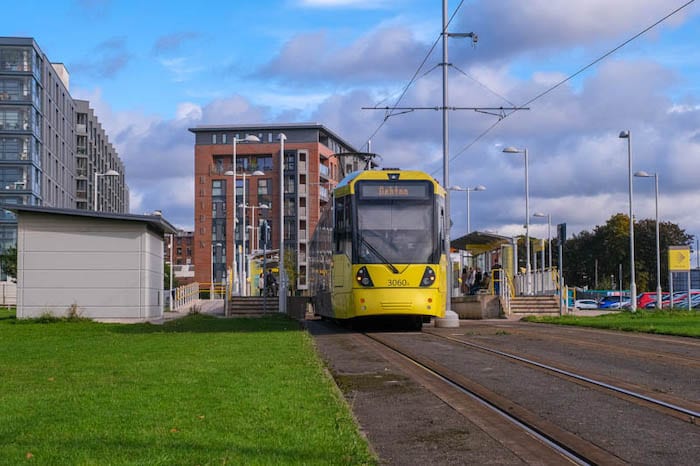
Places to eat and drink in Ancoats
Ancoats is, without a doubt, home to some of the most exciting eateries in the city.
From Little Vietnam to the main hub that sprawls out from Cutting Room Square into New Islington, every single one is independent and proud of it.
“I’ve lived and worked around Ancoats for almost twenty years and have always found the area fascinating,” says Thom Hetherington, CEO of Northern Restaurant & Bar. “With its contrasting architectural forms, functions and scales, unified by an unrelenting street grid, it feels very separate and distinct to the rest of the city.
“Ancoats may have undergone a transformation in recent years, but it remains true to its roots,” believes Thom.
“The recent boom in new residents and creative businesses, not to mention the unprecedented influx of quality food and drink operators, has rightfully seen Ancoats lauded as one of the country’s ‘hippest neighbourhoods’”, he says.
“But I think that although it has undergone significant change, the current balance, blend and energy of the area remain absolutely true to Ancoats’ rich history.”
Edinburgh Castle, a brilliant gastropub, has just been named as one of the best gastropubs in the UK. And we can’t say we are surprised.
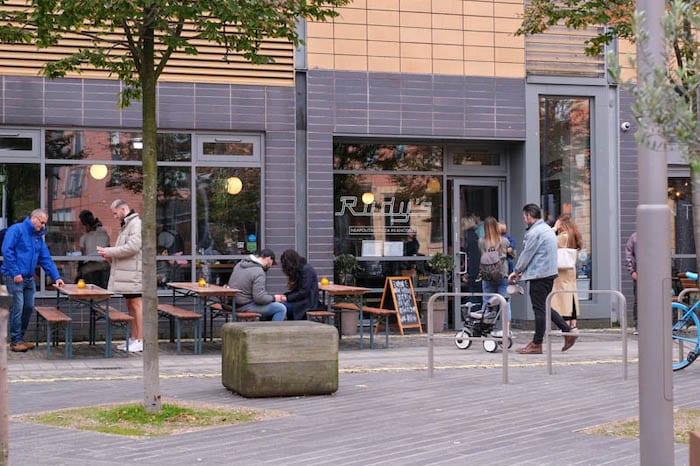
One of Ancoats’ original indie openings, Rudy’s can be credited (in part) with kickstarting the areas hipster revival. Widely regarded as making one of, if not the, best pizza in Manchester, it was attracting queues long before the area developed the reputation it has today. Go for the award-winning Neapolitan sourdough, stay for the ice cream specials.
El Gato Negro’s sister restaurant Canto opened on Cutting Room Square last year, serving up Portuguese cuisine inspired by chef patron Simon Shaw’s travels and head chef Carlos Gomes’ Porto upbringing.
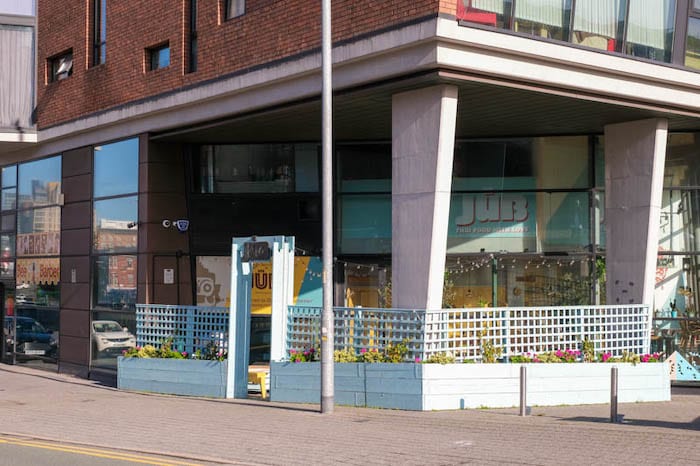
Known for its menu of small plates inspired by local produce and heritage, Elnecot specialises in British cuisine and can be relied on for a great glass of vino. Its name references a piece of Ancoat’s history and dates back to the first recording of the area in 1212.
Housed in what was previously Anthony Barnes’ Squid Ink unit (another fascinating Ancoats food story in itself), Viet Shack has a buzzy vibe and walk-in-only seating policy. Having grown a loyal following with their stalls at the Arndale Market, they expanded their popular street food operation into Ancoats last year with great success.
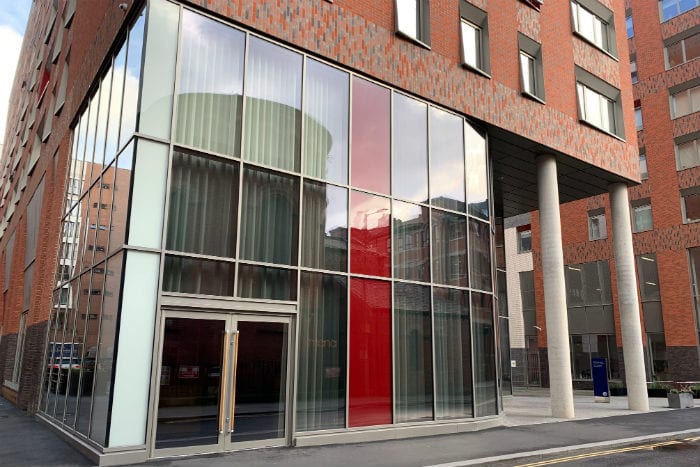
The first name on everyone’s lips, Mana is the restaurant that brought Manchester its first Michelin star in over 40 years. It was opened by ex-Noma chef Simon Martin and has consistently wowed foodies with elaborate fermented creations and, as The Times critic Marina O’Loughlin put it, all-round “backstage cleverness.”
Previously based in an archway on the Piccadilly Trading Estate, Pollen Bakery is another rising star of the independent foodie boom. Its fans once trekked in all weathers to queue for their goodies on a Saturday morning, but can now sit beside the beautiful New Islington Marina in the bakery’s cafe overlooking the water. Known for its impeccable sourdough and intricate viennoiserie (cruffins, anyone?), these days the Chow Chow Maru is almost as legendary.
From the people behind Trove bakery, Erst focus on simple seasonal food, natural wines and craft beers. It specialises in natural, low-intervention wines – many of which you can buy to take home – accompanied by a stunning selection of small plates.
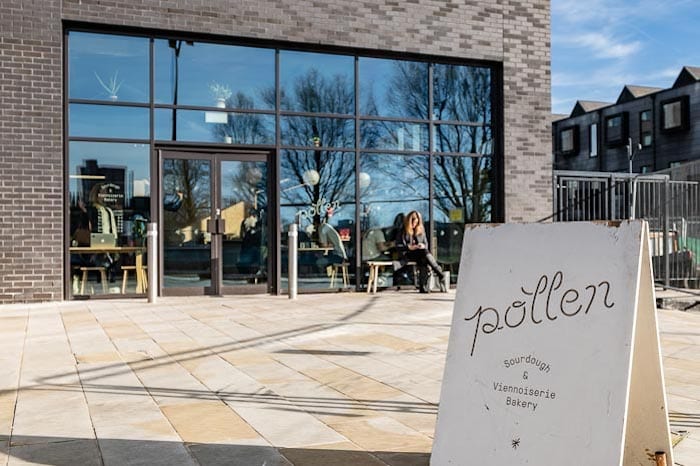
Manchester’s first community-supported bakery, Companio was set up by Russell Goodwin four years ago. He raised funds from local residents in the form of a loan, repaid in fresh-made bread. Open Tuesdays and Thursdays when you’ll find a selection of artisan loaves inside.
A longstanding rival to Pollen, Levenshulme bakery Trove can also be relied upon for quality sourdough. But the star of the show has to be the fennel and rye loaf. A relative Ancoats newcomer, pick up a loaf (or some cake) to take home or sit in to indulge in something from the kitchen. The breakfast menu here is a must.
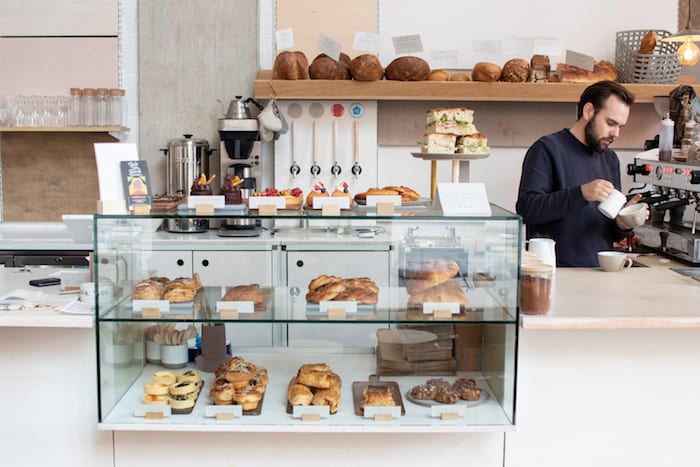
Hip Hop Chip Shop was named Manchester’s Most-loved Casual Restaurant at the 2023 I Love MCR Awards. Their eighties boombox trailer is the stuff of legends, as is the pimped-up, hip hop-themed fish and chip offering. Everything is made from scratch. The deep-fried mushy pea fritters are a must, as is an accompanying side of gravy for dipping.
“My stepdad often regales tales about growing up in ‘Ancuts’ and stories about places that no longer exist, so the main reason we’re going is that it’ll be nice to give him some stories in the present tense,” says Jonathan ‘Ozzie’ Oswald, co-founder of the Hip Hop Chip Shop. “I kid. Sort of.”
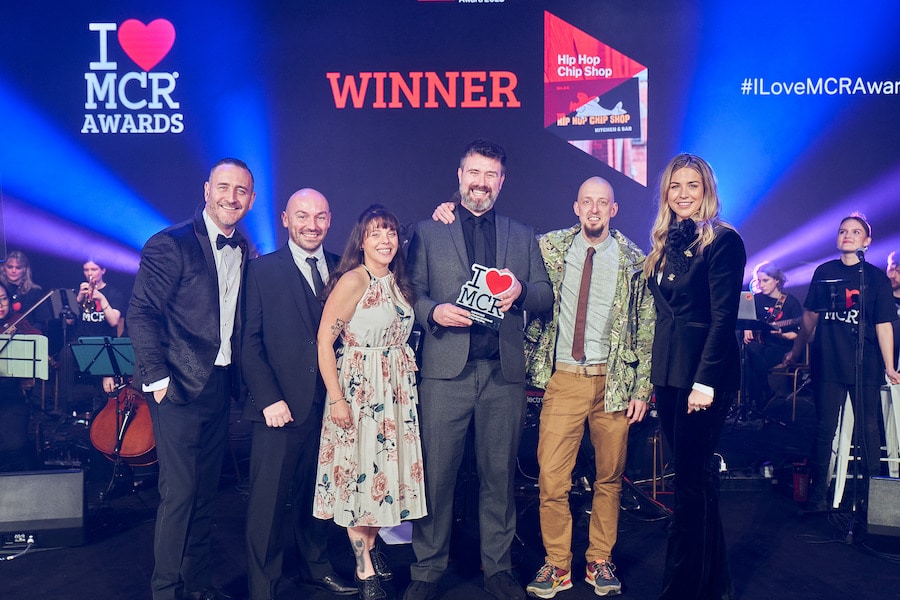
The Hip Hop Chip Shop has built its business from scratch over the last four years, and the owners say a big pull for them was the vision of creating a haven of independent businesses who simply care about their craft.
“It’s an area certainly on the cusp of huge retail growth given the large amount of rental properties soon to be on the market,” says Ozzie. “I think it’s hugely important that tradition co-exists with transition without becoming too sterile – as long as the community has a voice. That’s the most important thing.”
Cask is great for beer lovers. Hand-pulled casks, draught beers and brightly coloured cans abound and a Ghostbusters pinball machine and board games. Just like the original Liverpool Street bar, in true neighbourhood style you’re more than welcome to order a takeaway or bring your own food in.
Another Cutting Room Square early bird was Seven Brothers. The Salford brewery opened in 2014 and two years later it opened its snazzy Ancoats bar. Filled with plush leather seating and rich wood surfaces, you can get your hands on all their core beers here. There’s also a selection of Manchester gin and a casual dining option if you’re feeling peckish.
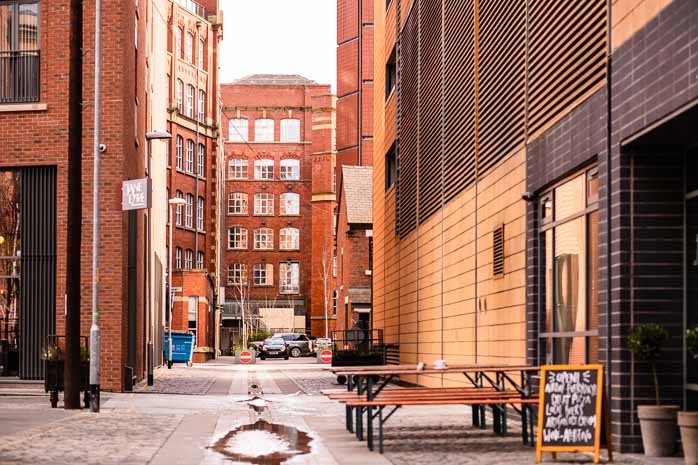
Not a reference to Charlotte Bronte, but rather a gesture of love from two sons to their mum, The Jane Eyre is run by brothers Joe and Jonny Eyre and specialises in fine cocktails and incredibly moreish small plates. The wine list is on point and breakfast is meant to be pretty good, too.
Grade II-listed gem The Crown and Kettle is one of Manchester’s oldest pubs, dating back to around 1800 and has a particularly fine and unusual ceiling. A small vault and snug at the rear offer a cosy place to hide away with a pint, and there’s a large seating area next to the main bar. Find a selection of ever-changing craft ales here from all over the country.
Somewhat of a local phenomenon, it was not at all unusual to see queues outside Japanese tea house Chaology before owner Mei implemented a strict booking policy. She performs a unique Japanese tea ceremony here, and all customers are emailed a strict set of rules in advance of their booking designed to maintain the tranquillity of the cafe. This is not just tea, but art. “It is not recommended to visit if the main purpose is chatting.”
Housed in a former cotton warehouse, Ancoats Coffee Co cafe and roastery is a must-visit. The cafe sits in a stunning courtyard with a glass ceiling and the beans are roasted on-site.
One of Ancoats newest openings, award-winning chocolate shop Cocoa Cabana made its reputation on West Didsbury‘s Burton Road before moving to open a second shop in Ancoats. The chocolate afternoon teas are legendary, as is the hot chocolate. They do chocolate cocktails, too.
Part of Oldham Road’s growing Little Vietnam, you’ll find Ca Phe Viet attached to the Vietnamese store. It was one of the first places in Manchester to sell Banh Mi and is said to have the best pho in the city.
Vnam opened in 2010 and claims to be Manchester’s first authentic Vietnamese restaurant. Hugely popular, head down for pho noodles, rice and sharing platters in a simple setting.
Glamorous Chinese Restaurant – This scarlet-themed restaurant filled with dragons sits above Ancoats oriental superstore Wing Yip, a gargantuan supermarket credited by many as a core factor in the creation of today’s Little Vietnam community. An extensive menu serves up Chinese favourites, including dim sum.
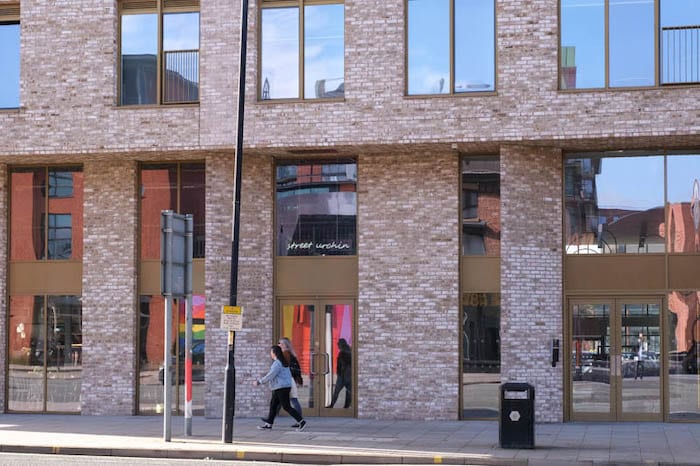
Newcomer Street Urchin is located on the Northern Quarter side of Great Ancoats Street, but it seems unfair to not consider it a part of the neighbourhood. It’s run by husband and wife team Kevin and Rachel Choudhary, who previously ran the popular Altrincham pub The Victoria and was inspired by Kevin’s dad who is a fisherman.
Rad’s is known for its authentic West Indian food and warm service. Everyone shouts about how great the jerk chicken is for good reason, and the patties are a must. They make their own ginger beer here, too.
The Chinese restaurant Blue Eyed Panda was opened by the husband and wife team behind the popular Great Ancoats Street takeaway Ancoats Panda, formerly known as Chop Chop. Expect plenty of dumplings and all the familiar Chinese favourites like salt and pepper chicken, crispy chilli beef, and sweet and sour dishes, plus sumptuous roasted Cantonese meats.
Le Social’s new wine bar in a shipping container might just be the cutest new drinking and dining concept in town, with just three tables. The Pollard Yard venue offers an ever-changing menu of natural wines, deli boards and continental plates.
Shopping
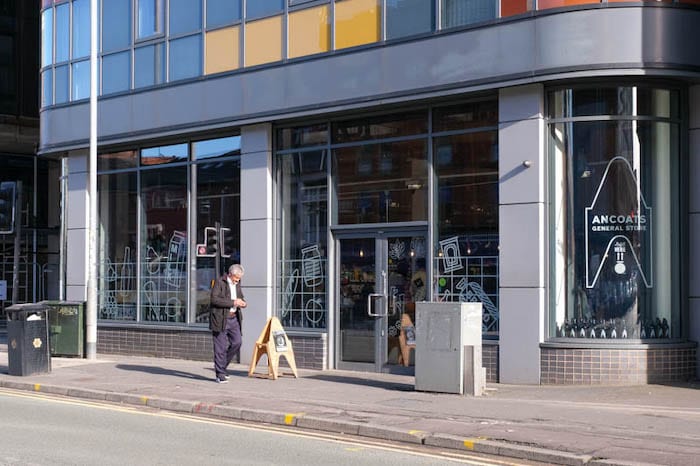
Given Ancoats’ proximity to the Northern Quarter, it doesn’t currently have the same network of independent shops as a typical suburb. What is there, though, is particularly unique and worth seeking out. For the rest, there’s always town – or the internet.
So much more than your standard neighbourhood corner shop, Ancoats General Store has it all: a post office, all the local products you could want, coffee-making equipment, plants, cards, and ever a little bar with tables, magazines, and games. Order local coffee, wine, beer or gin – and even fill up one of their custom growlers to take home. They also host the famous Scrancoats foodie pop-ups, whose alumni include Oh My Glaze, Oh Mei Dumpling and Malay Street Food and Little Orange Co.
Originally based further up Oldham Road, popular grocery store The Vietnamese Store was the first of its kind to open in the area. It moved to its current premises in 2012, opening its popular adjoining cafe three years later. Popular products available here include shrimp paste, Vietnamese pork roll and Vietnamese coffee.
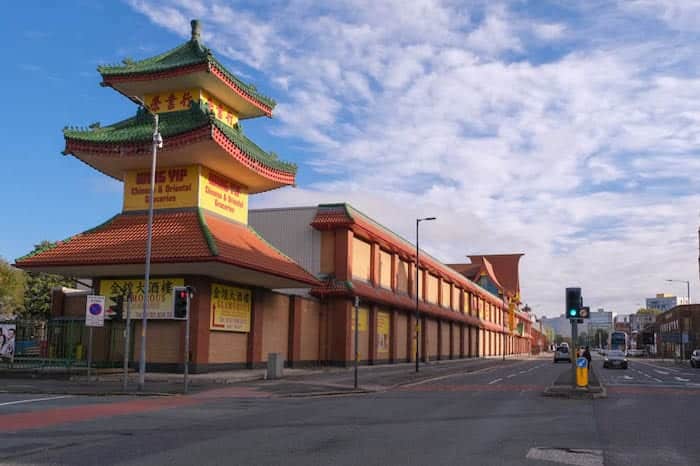
Wing Yip is the biggest Oriental supermarket in Manchester, if you want to find something specific for a recipe this is the place. Alongside a vast range of Chinese products, the extensive range spans Japanese, Indonesian, Malaysian, Singaporean, Thai, Filipino and Korean cuisines.
Ancoats and community
Bridge 5 Mill is Greater Manchester’s leading sustainability venue. The mill’s refurbishment was undertaken using as many sustainable materials and building practices as possible, and its environmental impact is considered in the day to day management of the building. Conference and meeting rooms are hired out on a sliding scale, which in turn allows Bridge 5 Mill to subsidise space for local charities, community and campaign groups.
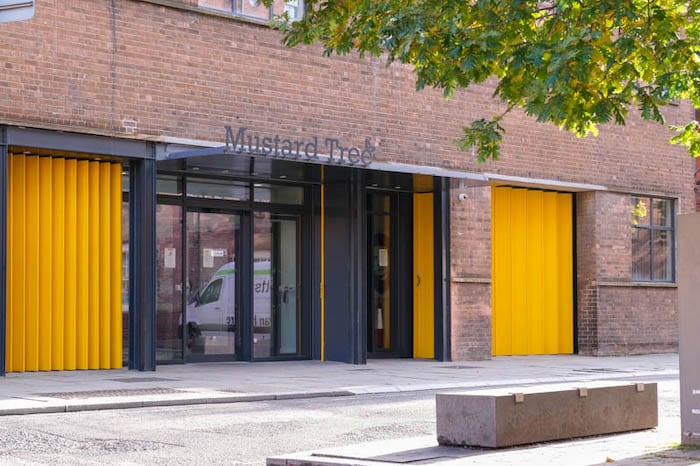
Focused on tackling the causes and consequences of poverty and homelessness, Mustard Tree has been in operation since 1994. Its Ancoats charity shop offers people access to low-cost food through the food club, clothing and household essentials such as furniture, pots, and pans, as well as providing a chance to find work placements, build confidence, recover self-esteem and unleash new potential.
Artisan baker Russell Goodwin of community bakery Companio runs courses teaching the basics of bread-making, with plenty of freshly baked goods to enjoy as you learn.
Ancoats is now home to one of Manchester’s best-regarded symphony orchestras, Halle St Peter’s, and also doubles as an event space and community hub.
Parks and recreation
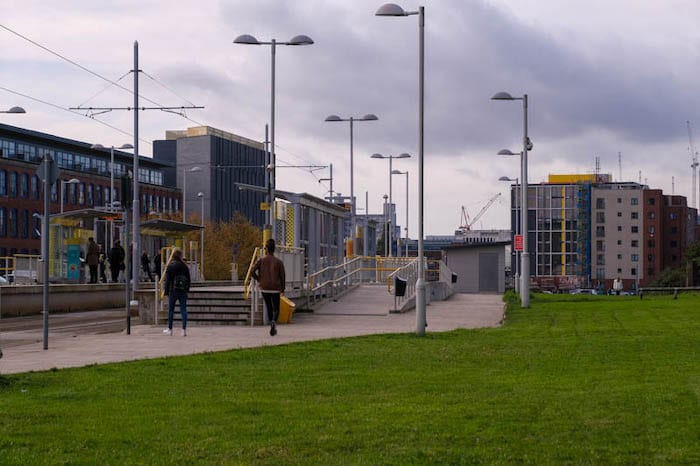
Ancoats, an area that has a deeply embedded industrial past is set to get a brand spanking new £32.7m park, Ancoats Green. This will act as a new focal point for the area and the closing chapter in the regeneration of Ancoats, which began more than 20 years ago. The scheme will include new walking and cycling routes, new play areas with accessible equipment, open grass areas, significant new planting, and space for hosting small events.
It’s not really a proper park, but New Islington tram stop is the next best thing. In the summer, the grassy area around the New Islington tram stop is packed with locals doing yoga, drinking beers in the sunshine or reading a book.
The Peeps are a series of brass eyepieces built into the walls of the buildings around Ancoats that give you a glimpse into the past. Opinions vary as to how many there are to be found, but this handy map should give you a good place to start.
The passion project of couple Joseph Houston and William Whelton, Hope Mill Theatre was inspired by the highly regarded off West End theatres and small producing venues which dominate the London theatre scene. A hub for Manchester’s evolving theatre culture, Hope Mill has become one of the most successful and reputable independent venues in England.
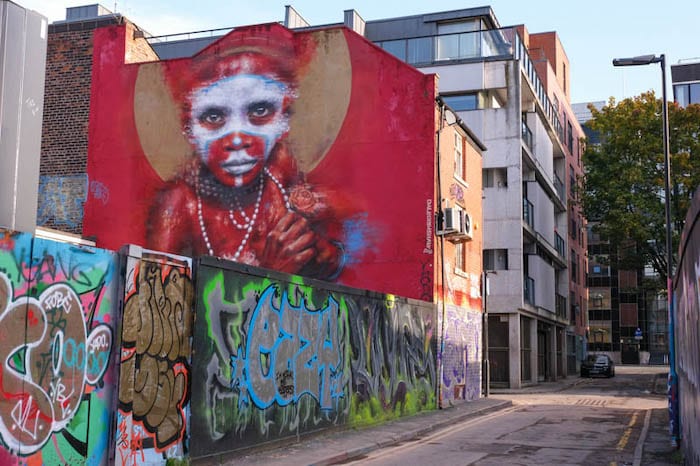
Dotted across Ancoats are some incredible pieces of street art, many created as part of the Cities of Hope festival which has brought world-renowned artists to Manchester to create pieces that tackle world issues. Elsewhere, in Cutting Room square you can find public artworks by local artist Dan Dubowitz (who is also behind The Peeps).
Under the management of the Hallé, St Michael’s was founded in 1859 and became the heart of Ancoats’ Little Italy Community. Today it hosts some must-see music events.
Affordability in Ancoats
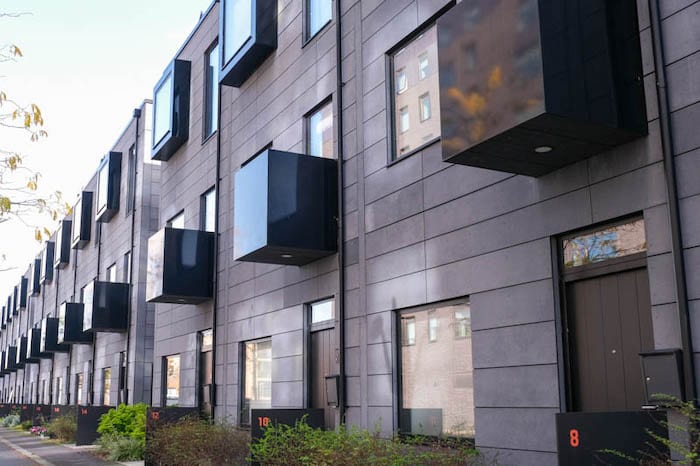
Property in Ancoats isn’t the cheapest. And prices are only going up – so there’s still time to invest. Since July 2019, property prices in the area have risen 1.29% – unlike many other desirable neighbourhoods, which have seen value falls of around 3%.
An extension of the Northern Quarter and the neighbouring Ancoats Urban Village, the New Islington regeneration scheme by Urban Splash is transforming the way families can live in central Manchester. With new homes now on sale, choose between a three storey Town House, family homes with parking and private terraces, and brand new beautifully designed Mansion House apartments, overlooking New Islington Marina. You can even choose between nine different apartment layouts to suit your way
of living.
This is the Place is the name of a poem by Tony Walsh commissioned by Forever Manchester, the only charity that raises money to fund and support community activity across Greater Manchester. And they can’t do it without your help. Donate what you can because investing in your local community to help it thrive can be a hugely rewarding experience. There’s a unique sense of satisfaction in knowing that you are making a real difference to the lives of others, especially to those close to home.
Photos: Nathan Whittaker and Stephen Cottrill
- This article was last updated 1 year ago.
- It was first published on 13 October 2019 and is subject to be updated from time to time. Please refresh or return to see the latest version.
Did we miss something? Let us know: press@ilovemanchester.com
Want to be the first to receive all the latest news stories, what’s on and events from the heart of Manchester? Sign up here.
Manchester is a successful city, but many people suffer. I Love Manchester helps raise awareness and funds to help improve the lives and prospects of people across Greater Manchester – and we can’t do it without your help. So please support us with what you can so we can continue to spread the love. Thank you in advance!
An email you’ll love. Subscribe to our newsletter to get the latest news stories delivered direct to your inbox.
Got a story worth sharing?
What’s the story? We are all ears when it comes to positive news and inspiring stories. You can send story ideas to press@ilovemanchester.com
While we can’t guarantee to publish everything, we will always consider any enquiry or idea that promotes:
- Independent new openings
- Human interest
- Not-for-profit organisations
- Community Interest Companies (CiCs) and projects
- Charities and charitable initiatives
- Affordability and offers saving people over 20%
For anything else, don’t hesitate to get in touch with us about advertorials (from £350+VAT) and advertising opportunities: advertise@ilovemanchester.com
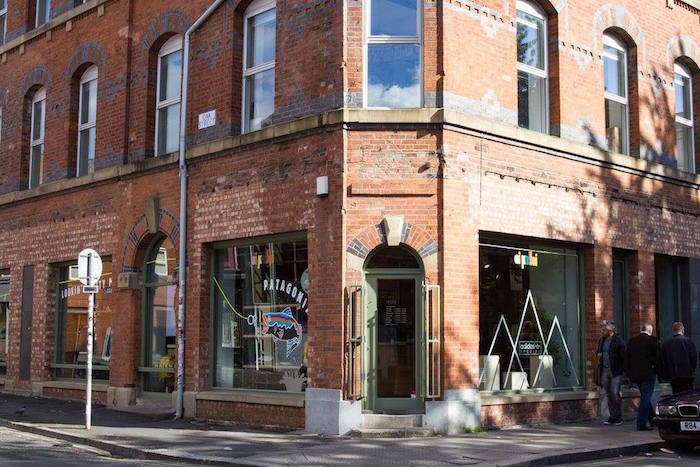
Iconic Northern Quarter menswear store makes a comeback with new styles and big ambitions
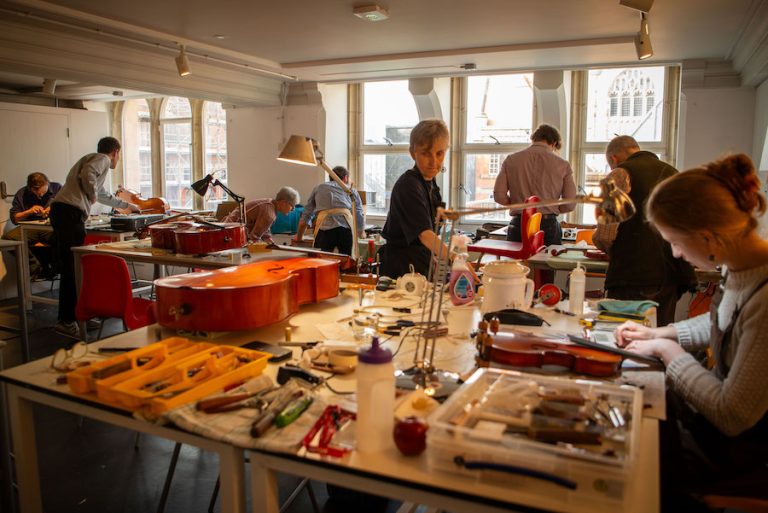
The charity celebrating ten years of making music accessible for all

Review: The House Party at HOME is ‘a bold exploration of modern class divides’

Ukrainian artist studying in Manchester shares inspiring message about living life to the full
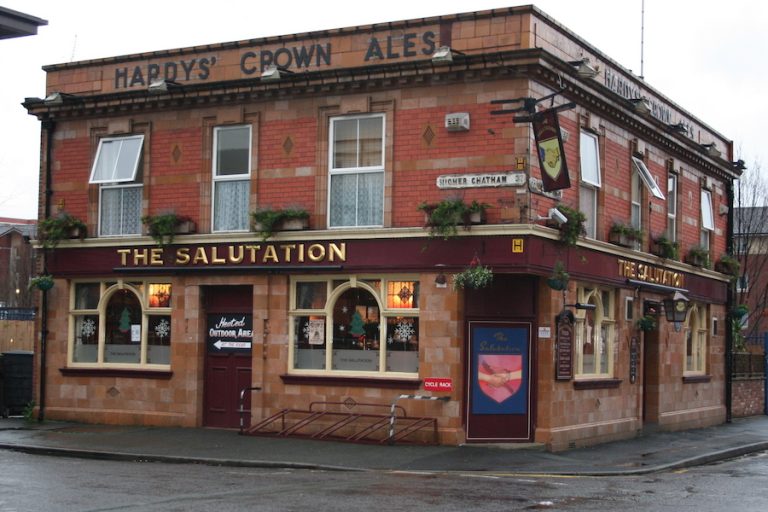
How The Salutation became a cornerstone of Manchester’s story







